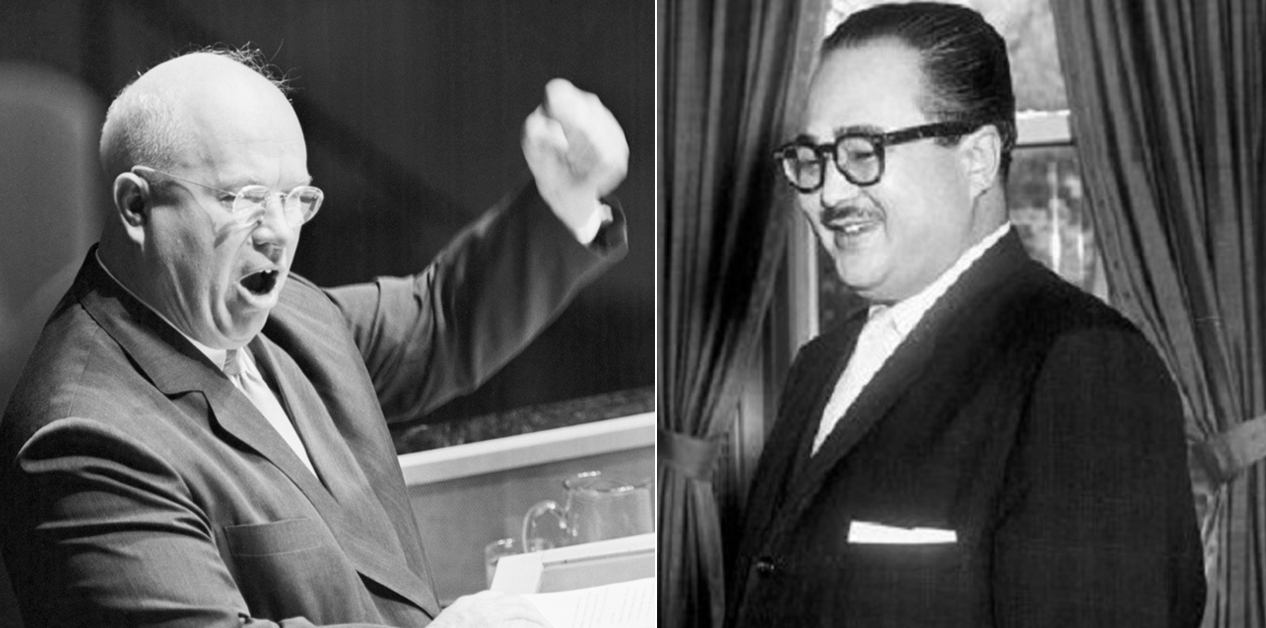
Recalling the incident still makes Arjel laugh: “As soon as he saw Rishikesh Shah, Khrushchev flared up and said to BP – ‘This is an American man.’”

KATHMANDU: October 14, 1960. Then First Secretary to the United States, Narayan Prasad Arjel, waited at the entrance of a Manhattan hotel to receive guests.
A man in a hat and overcoat—then Soviet Premier Nikita Khrushchev—stepped out of a car flanked by security, and the evening’s banquet hosted by Nepal was underway. The event was laden with diplomatic significance, especially since just days earlier, protests had erupted at the United Nations over Khrushchev’s unpredictable conduct—protests led by then Nepali Ambassador to the U.S. and Permanent Representative to the UN, Rishikesh Shah.
The day before, American newspapers had featured Shah with the headline: “Khrushchev’s behavior is indecent. It affects the regional balance.” That story broke just hours before Nepal’s banquet, creating a remarkable coincidence of timing.
The banquet attracted prominent figures including then Indian foreign policy planner Krishna Menon and then Israeli Foreign Minister Golda Meir. Then Indian Prime Minister Jawaharlal Nehru had informed the Nepali delegation that prior commitments would prevent his attendance.
For Arjel and the other diplomats, Khrushchev’s arrival was unpredictable. Just two days earlier, at the UN General Assembly on October 12, he had taken part in the notorious “shoe incident.” Sitting near then Nepali Prime Minister B.P. Koirala at the back, Arjel observed Cold War tensions flare firsthand.
During the Assembly, then Philippine Foreign Secretary Lorenzo Sumulong had remarked, “The people of Eastern Europe are deprived of political and civil rights. They have been swallowed by the Soviet Union.” Khrushchev erupted, removed his right shoe, waved it at Sumulong, and slammed it on his desk. The hall erupted into chaos; Khrushchev gestured angrily with a clenched fist. U.S. Assistant Secretary of State Francis O. Wilcox intervened, and the shoe was replaced.
B.P. Koirala leaned toward Arjel and whispered, “Rustic,” a subtle comment on the absurdity of the scene. Both men had grown accustomed to Khrushchev’s dramatic flair.
When Arjel arrived in the U.S. in 1959 as First Secretary, Khrushchev had conducted his first-ever state visit to America, which the press covered obsessively. Even trivial matters made headlines: when the Soviet embassy asked where Khrushchev might drink water, the U.S. replied, “Even the water poured on the plants in the park is drinkable here,” and newspapers turned it into a spectacle.

Khrushchev protesting by sitting with his shoe on the table while U.S. Assistant Secretary of State Francis O. Wilcox was delivering a speech at the United Nations. Photo: United Nations Library.
During his U.S. tour, Khrushchev visited Washington, New York, California, Pennsylvania, and Camp David. In Hollywood, he observed the popular “can-can” dance but turned away, calling it provocative. Observers such as B.P. Koirala suspected theatrical intent.
At the Nepali banquet, a similarly dramatic moment occurred. As Arjel escorted Khrushchev into the hotel, they encountered Rishikesh Shah. (Arjel, now 94, later recalled the moment with amusement.) “After seeing Rishikesh Shah, Khrushchev got angry and said to B.P., ‘This is an American man,’” he remembered. “B.P. replied, ‘No, Your Excellency! He is our man.’” Khrushchev’s anger stemmed from Shah’s earlier criticism, but B.P. Koirala skillfully shifted the conversation and diffused the tension.
Khrushchev went on to deliver a marathon 2-hour-20-minute speech at the Federation meeting—roughly 19,000 words. He praised then Cuban President Fidel Castro, proposed relocating the UN headquarters to Switzerland or Moscow, and criticized the U.S. treatment of African representatives. In contrast, Castro had chosen to live among Harlem’s poor instead of luxury hotels, signaling solidarity with Black and impoverished Americans.
Khrushchev also sought Nepal’s support, inviting B.P. Koirala to the Harlem hotel where he was staying and personally escorting him to the parking lot. “Khrushchev’s voice was vociferous in favor of African and Asian countries under colonial rule. He wanted their support, and they welcomed his stance,” Arjel remembered.
Despite Khrushchev’s proposals, B.P. Koirala declined to endorse moving the UN headquarters or forming a three-member committee to replace the Secretary-General. Still, the banquet and its interactions remain a striking episode of diplomacy, Cold War theatrics, and Nepal’s deft navigation of global affairs.